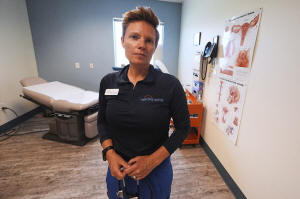Congress targeted Planned Parenthood for defunding, but also caught a
Maine health care provider
[July 17, 2025]
By PATRICK WHITTLE and GEOFF MULVIHILL
PORTLAND, Maine (AP) — An item in Republicans' sweeping policy and tax
bill intended to block Medicaid dollars from flowing to Planned
Parenthood, the nation’s biggest abortion provider, is also hitting a
major medical provider in Maine.
Maine Family Planning filed a lawsuit against the Trump administration
Wednesday seeking to restore the reimbursements.
Accessing health care in Maine — one of the Northeast's poorest states
and its most rural — is a challenge in areas far from population centers
such as Portland and Bangor.
Vanessa Shields-Haas, a nurse practitioner, said the organization's
clinics have been seeing all patients as usual and completing Medicaid
paperwork for visits — but not submitting it because it appears the
provision took effect as soon as the law was signed.
“Knowing how hard it is to access care in this state, not allowing these
community members to access their care, it's cruel," Shields-Haas said.
Maine clinics appear to be only others included in cuts
Republican lawmakers targeted Planned Parenthood in one piece of what
President Donald Trump dubbed the “big beautiful” bill that Congress
passed and the president signed earlier this month.
While advocates focused on Planned Parenthood, the bill did not mention
it by name. Instead, it cut off reimbursements for organizations that
are primarily engaged in family planning services — which generally
include things such as contraception, abortion and pregnancy tests — and
received more than $800,000 from Medicaid in 2023.

The U.S. Senate's parliamentarian rejected a 2017 effort to defund
Planned Parenthood because it was written to exclude all other providers
by barring payments only to groups that received more than $350 million
a year in Medicaid funds. The not-for-profit Maine organization asserts
in its legal challenge that the threshold was lowered to $800,000 this
time around to make sure Planned Parenthood would not be the only
affected entity.
It is the only other organization that has come forward publicly to say
that its funding is at risk, too.
Federal law already bars taxpayer money from covering most abortions.
Instead, the money in question involves other health services, such as
cancer screenings and tests, and treatment for sexually transmitted
infections.
Proponents of that wrinkle in the law say abortion providers use
Medicaid money for other services to subsidize abortion.
“This has never been just about Planned Parenthood," Autumn Christensen,
vice president of public policy for Susan B. Anthony Pro-Life America,
said in a statement. "It’s about any Big Abortion business or network
that performs abortions. Taxpayers should never be forced to prop up an
industry that profits from ending human lives.”
The U.S. Department of Health and Human Services, which is named in the
lawsuit, declined to comment because it's a legal matter.
Maine Family Planning goes beyond abortion
Maine Family Planning operates 18 clinics across the state.
In 2024, it had about 7,200 family planning patients, plus another 645
who obtained abortions. Services include pregnancy testing,
contraception, family planning counseling, breast exams, cancer
screenings and treatment of sexually transmitted infections.
[to top of second column]
|

Vanessa Shields-Haas, a nurse practitioner, poses at the Maine
Family Planning healthcare facility, July 15, 2025, in Thomaston,
Maine. (AP Photo/Charles Krupa)
 Some of the sites also offer primary
care services, where there are another 600 or so patients. There are
about 800 gender-affirming care patients and about 200 who use its
upstart mobile clinic, said George Hill, the president and CEO of
the organization.
Hill said that for about two-thirds of its patients, Maine Family
Planning is the only place they get medical care in a typical year.
About half of the patients not seeking abortions are enrolled in
Medicaid, and the clinics have been receiving about $1.9 million a
year in reimbursements, which accounts for about one-fourth of the
organization's budget.
“It’s a difficult state to provide care in and now we’re facing
this,” Hill said. In its lawsuit, the group says it has enough
reserves to keep seeing patients covered by Medicaid without
reimbursement only through October.
Finding health care can be a struggle in this rural state
Maine Family Planning says that if it had to turn away patients, it
would be more complicated for them than simply finding another
provider. There aren’t enough in rural areas, the group notes — and
many don’t accept Medicaid.
One patient, Ashley Smith, said she started going to Maine Family
Planning about five years ago when she could not find other health
care she could afford. While she's not enrolled in Medicaid, she
fears clinics could be shuttered because of cuts.
“I am so worried that if my clinic closes, I don’t know what I’ll do
or if I’ll be able to see another provider,” Smith said.
Maine Family Planning also supports care at more than 40 other
health care facilities. Other than the Planned Parenthood locations
that receive money from Maine Family Planning, those other providers
don't stand to lose their Medicaid reimbursements.
But, Hill said, the loss of Medicaid funding for Maine Family
Planning would mean the group would have less to send to partners.
The Maine clinics say the law violates their right to equal
protection
The Center for Reproductive Rights, which is representing Maine
Family Planning in the challenge, says in its legal filing that the
defunding denies it equal protection under the law because it would
have funding cut off, but organizations that provide similar
services would not.

“The administration would rather topple a statewide safety network
than let a patient get a cancer screening at a facility that also
offers abortion care,” Meetra Mehdizadeh, a Center for Reproductive
Rights lawyer, said in an interview.
Planned Parenthood already sued and won a reprieve from a judge,
preventing its Medicaid payments cutoff — at least until July 21 —
while a court considers that case.
Planned Parenthood has warned that the law could put 200 of its
affiliates’ roughly 600 clinics across the U.S. at risk of closing.
___
Mulvihill reported from Cherry Hill, New Jersey.
All contents © copyright 2025 Associated Press. All rights reserved |